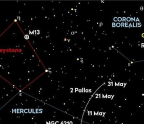Telescopes that changed ASTRONOMY

Over 400 years ago in 1608, Dutch optician Hans Lippershey filed a patent for his new invention, the refracting telescope. Astronomy would never be the same again. In the centuries since, telescopes have helped us glimpse the farthest reaches of the Universe and begin to unpick its secrets.
From the personal telescopes Galileo and Newton kept in their observatories, to the colossal telescopes that have to be built into the sides of mountains, we take a look at the instruments that have made – or hope to make – the biggest impacts in the held of astronomy…
GALILEO’S TELESCOPE
The Italian astronomer was the first to systematically map the heavens
In May 1609, Galileo Galilei learned of a remarkable new invention from the Netherlands that used lenses to make distant objects look as if they were nearby. Such a
You’re reading a preview, subscribe to read more.
Start your free 30 days





